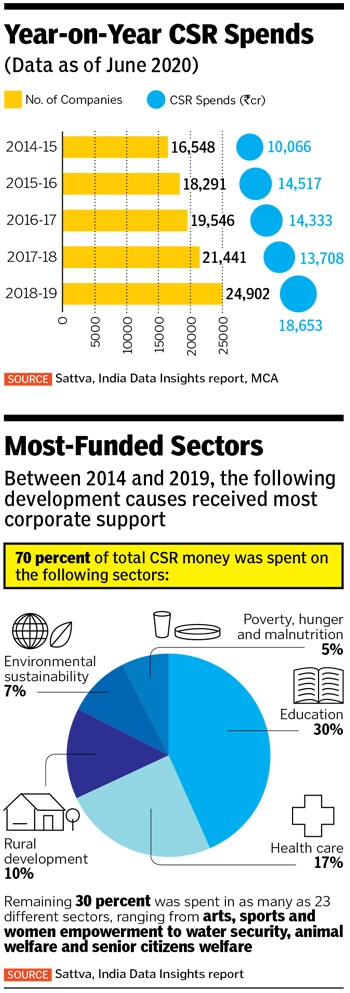CSR for Covid-19 is rising, but what about other causes?
Companies are channelising a big chunk of their CSR money towards the coronavirus response, leaving initiatives for other social causes scrambling to stay afloat


 Illustration: Sameer Pawar[br]Drawing from the experience of working in the social sector for over 20 years, and now in the tribal regions of Odisha and Jharkhand, Liby Johnson says people in these villages—including migrant workers who have come back home from the metros—will start feeling the pinch of the coronavirus pandemic more severely only by August.
Illustration: Sameer Pawar[br]Drawing from the experience of working in the social sector for over 20 years, and now in the tribal regions of Odisha and Jharkhand, Liby Johnson says people in these villages—including migrant workers who have come back home from the metros—will start feeling the pinch of the coronavirus pandemic more severely only by August.
State governments had sprung into action since the lockdown was first enforced in March, ensuring that the public distribution systems supplied food to people. Johnson, whose non-profit Gram Vikas works with about 1,500 villages to secure water, sanitation and rural livelihoods, says the villagers had managed to get sufficient food at home in April and May.
This security might not last, he says, because of a few challenges: First, cash income has reduced since public work through the National Rural Employment Guarantee Act (NREGA) and other schemes had stopped during the lockdown. Second, the 20 percent increase in village population (as per Johnson’s estimates from the regions he works in) due to reverse migration will put additional pressure on drinking water, sanitation, unpaid domestic labour for women, and housing, among other resources. “Third, fatigue will set in within the government system in a month or so, after which food supply and other essential services will not reach the poor easily,” he says.
Johnson has started to aggressively conserve organisational resources to prepare for these eventualities, along with another looming challenge: There won’t be enough monetary support coming in. Gram Vikas spends approximately ₹22 crore annually in social projects, about 35 to 40 percent of which comes from companies as part of their corporate social responsibility (CSR). Already, in March-end, a private corporation pulled the plug on a major funding that would have ensured water security in over 100 villages in east Odisha over the next three years, and diverted the money instead to PM Cares, the Covid-19 relief fund announced by Prime Minister Narendra Modi.
“We are yet to establish connection with our public sector undertaking (PSU) donors. They will take more time to finalise all the outlays, but have already announced hefty CSR support for Covid relief,” Johnson says. “The Jal Jeevan Mission was supposed to be launched [by the water resources ministry] this year, and it was supposed to bring in a lot of CSR support to drinking water and sustainability, but I reckon that will also be affected now.”Under the Companies Act, 2013, India has mandated that every company with a net worth of at least ₹500 crore, or turnover of at least ₹1,000 crore, or a minimum net profit of ₹5 crore during any financial year, should allocate at least 2 percent of average net profits of the last three years toward its CSR policy.
This money can be deployed by the company directly, or through trusts and societies set up by it, or by non-profits acting as implementation agencies on the company’s behalf. According to Sattva Consulting, a social enterprise working with NGOs and corporates to implement CSR projects, over 50 percent of total CSR funds are deployed by companies through non-profits.
Data by the ministry of corporate affairs (MCA) as of June, analysed by Sattva, indicates that in the last five years, companies have cumulatively spent over ₹71,277 crore across 105,358 CSR projects in various sectors. The number of companies coming under the ambit of CSR and the amount of money they spend have also seen a year-on-year increase (see box).
A report on the CSR outlook for 2020-21 published by Sattva’s data platform India Data Insights (IDI) studies outlays announced by the top 300-odd companies by revenue, which collectively account for over ₹10,000 crore of the yearly CSR funds in India. The annual CSR amount is pegged at around ₹15,000 crore based on an average of 2016-19.
According to the report, corporates have already allocated ₹7,853 crore to PM Cares and other Covid-related measures (see box). This means that only another ₹7,100-odd crore will be available for all CSR projects in other social sectors, provided companies do not make further allocations to the Covid response. PSUs have made the highest Covid-related contributions, setting aside as much as ₹2,500 crore out of their ₹3,000 crore budget for PM Cares, and another ₹18-20 crore for other Covid relief measures.
“Over 50 percent of the total CSR money has already been spent on Covid-19 relief, and we estimate at least a 30 percent reduction in company profits this year due to the state of the economy. This means there will be that much less available for CSR next year,” says Srikrishna Murthy, founder, Sattva.
Another June 2020 report by Crisil Foundation, the charitable arm of analytics firm Crisil, estimates that CSR money already given away by companies to Covid-related causes might be as high as 80 percent. “With the notification from the MCA on mandated activities/spending which qualify as CSR spending under Covid-19 as well as assuming companies will continue spending around the mandatory CSR mark, allocation to other—even ongoing—projects could come down,” the report states.
Covid-related causes range from relief to rebuilding, explains Murthy. This includes immediate measures like providing personal protective equipment (PPEs), ventilators and testing kits for hospitals, creating community awareness, distributing sanitisers, masks and meals to the poor, and building Covid health care infrastructure, and longer-term initiatives like upskilling, reskilling and employment avenues. Other critical social sectors that are currently taking a backseat in corporate priorities include water security, sanitation, sustainability, non-Covid health care, arts, sports and nutrition.
“There are several areas in which we operate. However, helping the nation fight Covid-19 and trying our best to positively impact lives will take precedence over many things this year,” says Sudha Murty, chairperson of the Infosys Foundation, over email. The non-profit arm of software major Infosys has committed ₹100 crore towards Covid relief. According to the Infosys annual report, Covid-19 forms the biggest chunk of expenditure for the Foundation among various social programmes in fiscal 2020.
Out of a total of about ₹360 crore spent during the fiscal, Covid-related expenditures are approximately ₹73 crore, where ₹50 crore went to PM Cares, and the rest were spent for other relief measures. The latter included protective gear and health supplies to hospitals, food rations to the poor and financial assistance to daily wage labourers.The remaining ₹283 crore CSR expenditure, as per the report, is divided among 35-odd traditional social sectors, including causes like education, flood relief work, rural development projects, environmental sustainability and health care [like oncology, infant and maternal health]. “It is understandable that the world as we have known is changing rapidly due to this pandemic, and we have to try our best to keep our focus steady and morale high,” says Murty, explaining that her team will continue to monitor the situation over the course of the year and extend support accordingly.
Survival of the fittest
The uncertainty surrounding the pandemic makes it difficult to determine the exact extent to which other social sectors will get affected, says Abhishek Humbad, founder, Goodera, a technology platform that maps and manages CSR projects for over 200 corporates in India that are in turn associated with over 6,000 non-profits. He believes that it will all come down to NGOs that have strong on-ground networks versus those that do not. “Corporate support will come easily to those organisations that prove that even with lockdowns or other restrictions, they will be able to reach the last mile at the grassroot level,” he says.
Murthy of Sattva says non-profits could be forced to make their programmes leaner. “Scholarships and school programmes may stop, child nutrition schemes might get diluted… this will obviously affect beneficiaries,” he says, explaining that he is already working with non-profits facing financial crises to see how they can effectively scale down full-blown programmes with minimum adverse impact.
Organisations like Tomorrow’s Foundation in West Bengal, which works on primary education for marginalised children and skill development, are seeing layoffs. “A large software company recently pulled out funding for one of our in-school programmes, saying they do not have money to spare… we had no option but to let go of five people working on that project after paying them a month’s salary,” says co-founder Swaroop Ghosh.Since the government is not running any programmes currently, funding for them has also stopped, Ghosh says. “Our only request to corporate donors has been to at least provide enough money to cover staff salaries so that layoffs don’t happen. We are already taking money for operations from our contingency fund. It has been a bit of a tough time, but we have to live with it.”
An article by advocate Sanchitta Sridhar for online portal The Wire states that CSR money going to government funds like PM Cares is contradictory to the recommendations made by high-level committees constituted by the MCA to study CSR spending in the country. The latter has stated that the whole philosophy behind CSR was to use the business efficiencies and innovations of the private sector in delivering public goods and services. The inclusion of PM Cares into the CSR ambit, therefore, is “a convenient tool to soften the outcome of inadequate fiscal preparedness”, the article states.
Murthy of Sattva insists that the “intent” of PM Cares is in the right place, but there is “an anxiety about when and how the money will be spent, and the impact it can have on social programmes”.
Innovating to stay afloat
Many non-profits and corporations are keeping their existing community associations and projects alive by tying them up to Covid-related causes for the time being. In a note shared with Forbes India, Tata Power explains that it reorganised its CSR initiative Dhaaga in which the company enabled women to make and find a market for fashion garments and accessories. During the pandemic, about 1,050 women in the network switched to creating homemade cloth masks. “They have successfully supplied more than 120,000 face masks in Maharashtra and Jharkhand,” the company states, indicating that ecommerce site Amazon has expressed interest in procuring cloth masks from the women, providing them a source of additional income.
Companies are currently working on a post-Covid CSR strategy, relooking at social causes, budgets and the teams required to execute these projects, says Humbad. “It will help if NGOs understand these focus areas and weave a narrative around their cause that has a strong Covid link. For example, arts projects could talk about protecting livelihoods of artisans during the pandemic, while those working in education for the vulnerable could focus on helping their beneficiaries adapt to the digital shifts in the sector.”
Ghosh is working to launch an impact investment programme to encourage corporate investors. “Instead of just ‘free money for jam’, this programme will be market-focussed where funders will get some social return on investment,” he says, while stating that there is need for companies to have their ears to the ground while allocating CSR funds and go deeper into causes and sectors beyond Covid that need help.
Another hopeful indicator is that companies are going beyond the mandatory 2 percent CSR outlays, meaning that more money could be made available for non-Covid causes. The Crisil Foundation report states that about 64 percent companies spent more than 2 percent on CSR in FY19, compared to 54 percent four years ago.
Humbad says individual corporate employees are signing up to be virtual volunteers, helping NGOs in the non-Covid sectors with essential skills. “For example, they will manage administration or accounting, helping the NGO save that cost,” he says. Between February and May, the number of people volunteering to help with their skill sets on the Goodera platform increased from 25,000 to 100,000.
Sattva"s Murthy believes that this fund crunch has opened up avenues for capital beyond CSR, including individual donors, crowdfunding, HNIs and family offices. “In the next two-three years, non-profits will have to become more efficient, come up with more innovative, low-cost delivery models. We have to fill this gap together, and hopefully, the government will also help.”
First Published: Jun 25, 2020, 10:49
Subscribe Now

